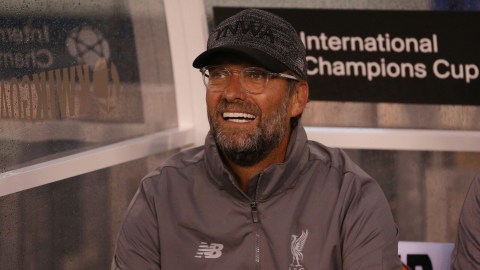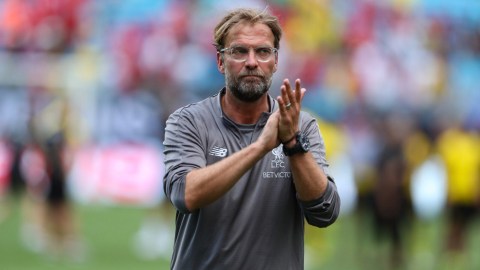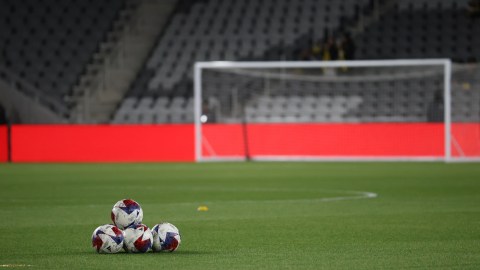 Michael Owen‘s career has been wildly successful. Yet, he underachieved at the same time.
Michael Owen‘s career has been wildly successful. Yet, he underachieved at the same time.
That paradox comes to light as the English soccer star announced that he will retire after the 2012-13 season. Tuesday’s news was met with a mix of acclaim, respect, nostalgia, melancholy and derision, among other sentiments.
Although his most glorious days came at the front end of his career, he persevered through a persistent string of injuries to walk away on his own terms at the ripe old (in striker’s terms) age of 33. It’s fitting that such a famous figure would provoke a wide range of opinions when it comes time to deliver a verdict on his playing career. Like life itself, his career was full of wonder, woe, joy and pain.
Owen’s retirement decision comes as no major shock. He failed to stay healthy and make an impact at Stoke City — the club he joined as a free agent in September. Stoke represented his last chance to prove that he could withstand the rigors of Premier League soccer and contribute at the top level, and that didn’t happen in 2012-13. He has only made seven appearances for the Potters, scoring one goal (which was his 150th in the Premier League).
Owen recently told the BBC that this season has been “frustrating” for him. When healthy, he has spent more time on the bench (or on his own couch watching burglars prowl on his property) than on the field. In September he said that he wanted to play two more seasons in the Premier League. He has no intention of joining a team in a lower division, and a move to an Australian club failed to materialize. As the season nears its conclusion, retirement seemed to be his best, and perhaps, sole option.
The final chapter of Owen’s playing career may be a failure, but it can’t tarnish what he achieved at its outset. After a standout career at various youth levels, he graduated to Liverpool’s first team and scored in his debut in May 1997. The following season, he was the Premier League’s top goal scorer and became an England international in early 1998 — at age 18. His status as a global superstar was confirmed that summer when he scored that wonder-goal against Argentina at the FIFA World Cup in France.
His ascension continued for the next 10 months, as he terrorized defenders with his blistering speed, poise, confidence and deadly finishing ability. But a hamstring injury he suffered in April 1999 ended his season and forever altered the trajectory of his career.
“Getting that massive injury at Leeds has probably changed and shaped my whole career,” Owen told the Telegraph last year. “Since I was 19, I’ve been compromised. If I did that now, it would be surgically repaired like it’s brand new. I wouldn’t even know I had an injury. Back then you just let it go.
“I basically run on two hamstrings on my right leg and three on the other. I’m losing a third of the power. If I hadn’t done that, 90 percent of the other injuries wouldn’t have happened.”
Owen’s balky hamstring flared up time and time again at the turn of the century, but he remained a key player for Liverpool and England. His goal-scoring feats powered the Reds to glory in the 2001 FA Cup, League Cup and UEFA Cup, and his hat-trick for England against Germany later that year helped him become the first English player to win the European Footballer of the Year award since 1979.
By the time Real Madrid bought Owen in 2004, he had already scored 158 goals at club level and 24 for his country. He was a 24-year-old superstar with a well-earned reputation for scoring big goals in big games. He fit in with Ronaldo, Raul, Luis Figo, Zinedine Zidane, David Beckham and other “Galacticos” in his one season in Spain. Although he was used mostly as substitute, he continued to score at an impressive rate.
When Owen returned to England in 2005, most thought his best years lay ahead, but his career had already started to decline by then. Injuries derailed his time at Newcastle (2005-09), Manchester United (2009-12) and Stoke City (2012 – present). Of the 220 goals he scored at club level, only 48 came after his August 2005 return to England. His national-team career suffered a similar fate. He tore his ACL in the opening game of the 2006 World Cup. The injury kept him out of action until April 2007, and he would play his last game for England in early 2008.
Despite the injuries, unfulfilled promise and unspectacular ending, Owen’s career was a smashing success. He set goals for himself and reached them. He scored them as well. He is the fourth highest goal scorer in the history of England’s national team. His teams won a host of trophies and he earned some of the most prestigious individual awards the game has to offer.
He only underachieved because the injuries (and there were far too many to list) took away his biggest asset — speed — and his best years. We can only imagine what he could have done in the second half of his 16-year career with two good legs. Most assume that he would have overtaken Bobby Charlton as England’s all-time leading goal scorer (49).
Owen doesn’t bother asking “what if?” He has too much to be proud of to do that.
“In the meantime I’ve won the European Player of the Year and a load of trophies while compromised,” he continued. “I could look back on my career like everyone with ‘what if this or what if that?’. If I’d still been in one piece from the 1998 World Cup and gone through my career, what type of player would I have been?’
“Some people think I was blighted with injuries, but I’ve played hundreds of games. Part of me thinks I’ve been the luckiest person in the world, too. I’ve played for Liverpool, Real Madrid, Newcastle, Man United, got 90-odd caps for England, 40-odd goals. I don’t need to work again, got four great kids. I’m not that unlucky.”
Owen’s journey reminds us of some of life’s essential truths. Things never turn out exactly like we think they should. It’s even rarer that they happen exactly as we expect them to. Fans who were a certain age when a teenage Owen burst onto the scene assumed that he would go on to become one of the greatest goal scorers in history — not just in England, but anywhere. If those fans saw his early exploits and projected them out, his name would undoubtedly join those of soccer legends past, present and future.
What neither they nor Owen saw was how much damage those early hamstring injuries had already done and would continue to do. Those fans were too busy watching him score prolifically, win awards and reach the top of the game. They probably hadn’t been exposed to some of the world’s harsh realities — the ones that see lives and careers blown off course at a moment’s notice.
Should the melancholy of today outweigh the unbridled joy of a decade ago in the minds of fans? Not necessarily. Owen never became a legend, but he became something more fitting: he was and is an example. Throughout his personal injury hell, he remained a model professional, earning the respect of teammates and coaches at some of the world’s biggest clubs. Some may not care for his cold and distant outward demeanor, but those closest to him have nothing but the best to say about him. He may not have gotten that second season at Stoke City, but his wife, children, horses and possible future as a broadcaster, national-team ambassador or coach will soften that blow. Owen is at peace with the oddly shaped arc of his career. It should remind us all not to take the great moments of any player’s career for granted. A glorious present does not last forever.
Have a question for Marcus Kwesi O’Mard? Send it to him via Twitter at @NESNsoccer, NESN Soccer’s Facebook page or send it here. He will pick a few questions to answer every week for his mailbag.



